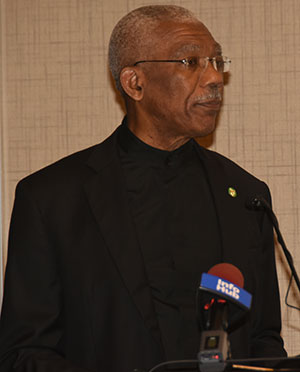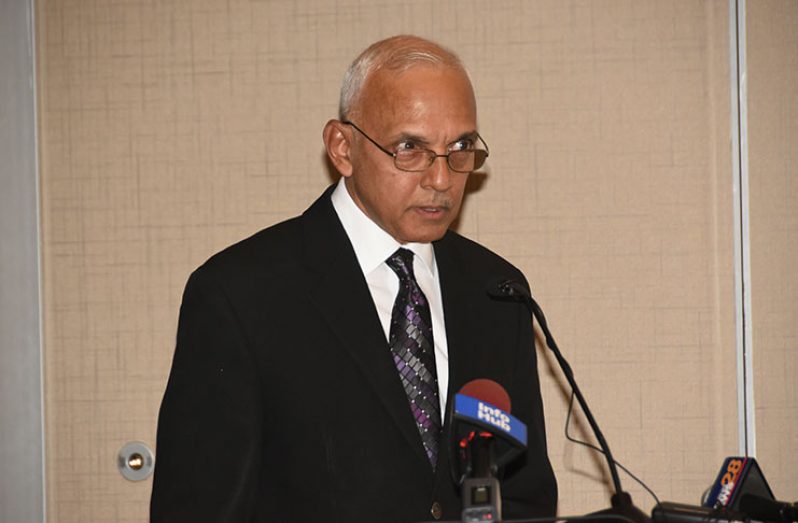THE strengthening of regional pride and ownership will not be held hostage by recalcitrance, said Minister of Communities Ronald Bulkan on Friday at the opening ceremony of the second National Regional Development Consultative Committee (NRDCC).

“Regional Democratic Councils (RDCs) will lead, follow or stand aside,” he told the gathering of regional officials at the Marriott Hotel. Minister Bulkan made it clear that his administration is committed to “building bridges across the chasm which divides us. We will continue to practise collaboration instead of confrontation. We will foster the politics of inclusion and we will achieve those objectives by solidifying local democracy. We will continue to invest political and financial capital in this quest,” he stated.
Themed “Strengthening regional governance through leadership and human resource development”, The NRDCC serves as a mechanism for coordinating the developmental agenda of the three spheres of government (local, regional and national). And according to the Minister of Communities, the NRDCC is a step towards increasing the efficiency of the regional administrative structure to support the bottom-up approach to democratic governance.
Moreover, the minister said the NRDCC will facilitate collaborate financial planning and administration which will allow for more accountability, transparency, partnership among stakeholders and planning which will assist in the effective delivery of public services throughout the country. Additionally, Bulkan told the gathering of regional officials, government officials and members of the diplomatic corps, that the NRDCC will ensure that government’s agenda of decentralisation is seamlessly implemented as it will facilitate networking and allow for regional programmes.
During this process, the authority and autonomy of the RDCs would be respected. “The NRDCC will become an established conduit and key platform for discussions among national, regional and local leaders,” said Bulkan.
In outlining the history of Guyana, the Minister of Communities said that after 135 years of British colonisation, and more so in the half a century since gaining political independence, Guyana’s progress continues to be “severely impeded by the makeup of its population owing to historical realities.”

He reminded the audience that part of the country’s independence inheritance is a population comprising two major race groups which arrived from two different continents. “A natural fault line; a line ripe to be taken advantage of by politicians seeking a political throne.”
Bulkan pointed to the declaration of results of the 1997 general and regional elections when Guyana was reportedly described as two countries in one place. The results of the May 2015 elections which saw the first coalition government being elected to office suggests that the “phenomenon is virtually immutable.”
“This ugly and self-defeating position can likely be traced to the 1964 elections, where the electorate fell prey to the ferocious urging of the ‘Don’t-split-the vote’ campaign that resulted in the total rejection of Balram Singh Rai’s Justice Party, a party that was committed to the pursuit of free enterprise instead of communism as the model for the development of our country.”
Bulkan warned that lack of social cohesion is the main contributor to Guyana’s under-development and significantly to the unchecked exodus, and the haemorrhaging of human resources. He noted too that founding fathers by necessity were forced to grapple with the type of governance arrangements that would be most suitable for the peculiarities described.
“It is sad for me to acknowledge that the political opposition are either not listening or are uninterested in pursuing this model of governance,” said Bulkan, who pointed to an opposition Member of Parliament who described the meeting as sinister and one that usurps the powers of the RDCs.
“This is sad and may I add, irresponsible,” the minister remarked, while commending the regional chair and vice-chair for the Upper Essequibo-Upper Takutu and Potaro-Siparuni regions for being present at the forum. He said their presence indicates that they do not share the view of the opposition People’s Progressive Party (PPP). Bulkan said all mayors, regional chairs and vice-chairs were invited to the event, but a number were absent.
The ministry has received only one excuse of absence from the regional chairman of the East Berbice region. He reminded participants that he had forewarned in his Budget 2018 speech to regional leaders that there will be repercussions should they decide not to participate in the scheduled activity. “I did say that they either participate or be left out.”
Bottom-up model
Meanwhile, he said the founding fathers determined that the said arrangements needed to reject the Westminster model of winner-takes-all politics and to embrace a bottom-up model of representative democracy. Central to that model is the concept of local democracy. Minister Bulkan shares the view that a model of governance which puts decision-making power directly into the hands of citizens, would more likely result in national healing, social cohesion, democratic inclusion, and the eventual forging of a truly united Guyanese identity.
“That model of governance was given shape in the new constitution enacted in 1980 and which provides for a decentralised form of government and one that places power in the hands of the people,” he stated. Citing Article 77 of the Constitution of Guyana, the minister said the constitution prescribes that the development programme for each region shall be integrated into national development plans, and the government shall allocate funds to each region to enable it to implement its development programme.
He noted too that while there is a constitutional provision along with elected councils- RDCs, municipalities and NDCs, “they were previously seen as representing cosmetic value and extensions of the central government.”
Echoing similar sentiments, President David Granger said local democratic organs, including municipalities, NDCs, community and village councils form part of the state’s democratic operations. He said by virtue of the constitution, local democratic organs ensure the efficient management and development of their areas and provide leadership by example.
“Our constitution demands therefore that local democratic organs be responsible for the management and development of their areas—the historical emphasis on strong central government control and the absence in over two decades of local democratic elections, retard the development of a vibrant system of local government,” the President stated.
The re-introduction of local democratic elections on March 18, 2016 renewed local democracy here and opened up local democratic organs and attempted to wean them away from excessive dependency on central government, said President David Granger.
“The new regional system therefore, must not embalm the obsolete colonial approach by perpetuating the arrogant attitudes of the past. The opportunity must be taken to abandon the colonial approach and adopt a consultative approach to public administration,” the President added.
As a result, he said his administration is continuously trying to strengthen the system of public administration by making each administrative region more resourceful, and geographically and infrastructurally more integrated. “The government aims eventually at ensuring that each region would possess its own capital town; this is necessary to deliver administrative services and to promote economic development…We are coming out of an obsolete system which [did not work]…” the President noted.
“Your government today expects each region to develop the capacity and capability, creating employment opportunities for its young people. Young people should not have to go across the border to look for work; there should be technical institutes in their own regions,” said the head-of-state.
President Granger said too that each region must develop the capability to attract investors; there must be friendly business districts, industrial parks and busy highways. The establishment of the NRDCC he added allows for the achievement of common goals. The President reminded that government operates at three levels, local, regional and national and all three must work in unison to achieve the developmental objective. He chided regional chairmen who refuse to attend important government functions and said it is time to end divisionism.
Friday’s opening ceremony was followed by a business session and caucus deliberation. The regional chairpersons were required to detail policy directions and plans for future development of their RDCs for the year, discuss specific issues of national importance and arrive at resolutions, report on challenges, lessons learnt and success stories and development in the region and propose policy recommendations to strengthen the system of regional administration.
Additionally, the regional chairmen were to report on the progress and timelines for the renaming of regions, regional flags and symbols, Regional, Agricultural and Commercial Exhibitions (RACE) and capital towns in the case of Essequibo Islands-West Demerara, Demerara-Mahaica and Mahaica-Berbice regions.




.png)









